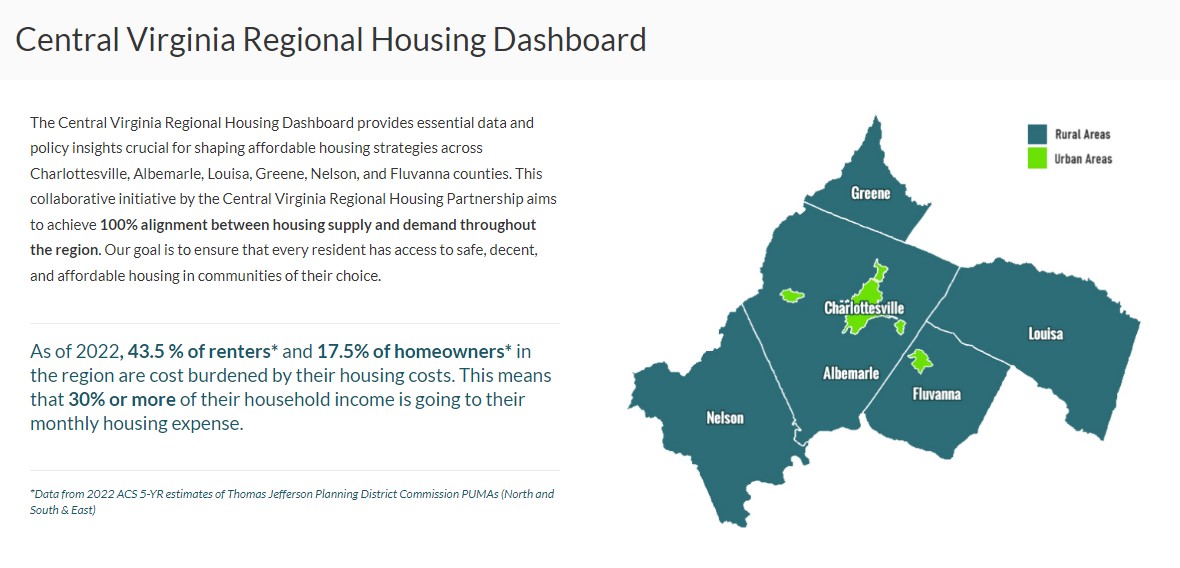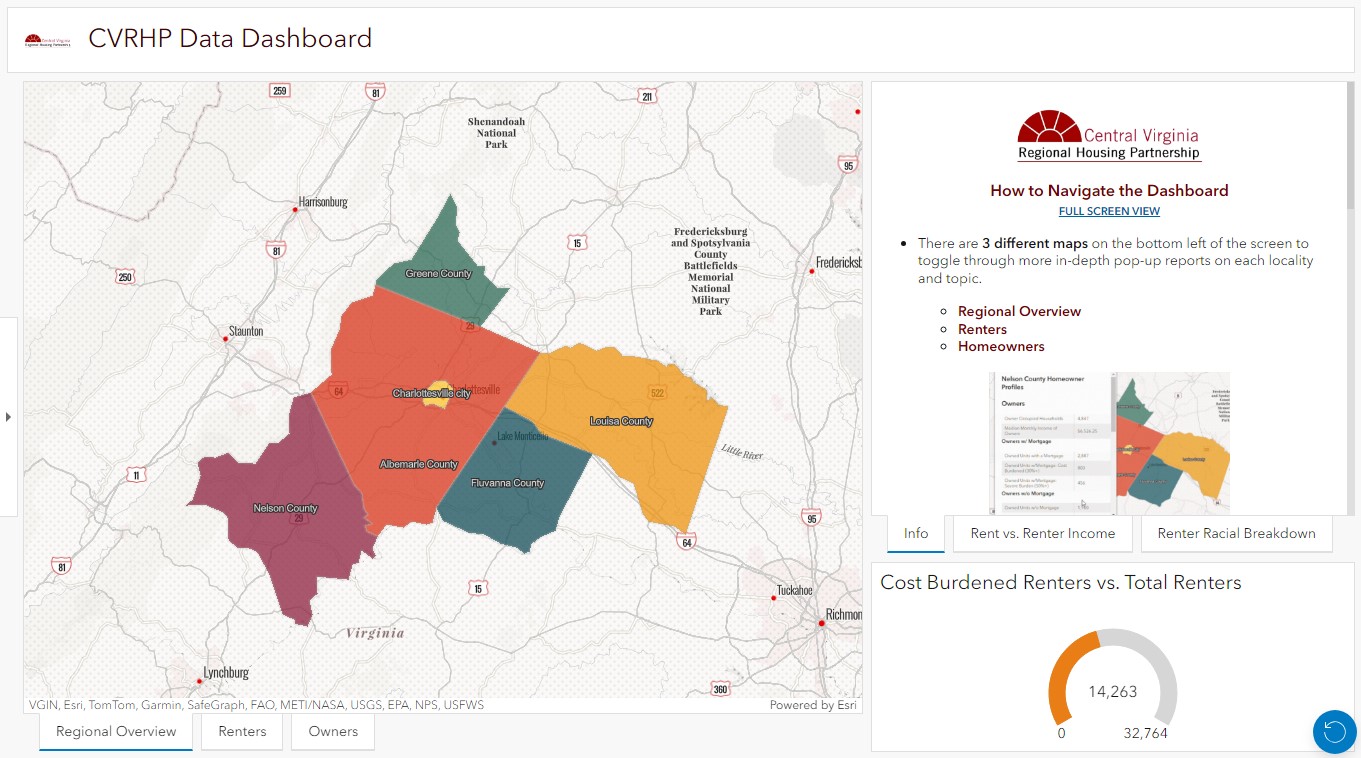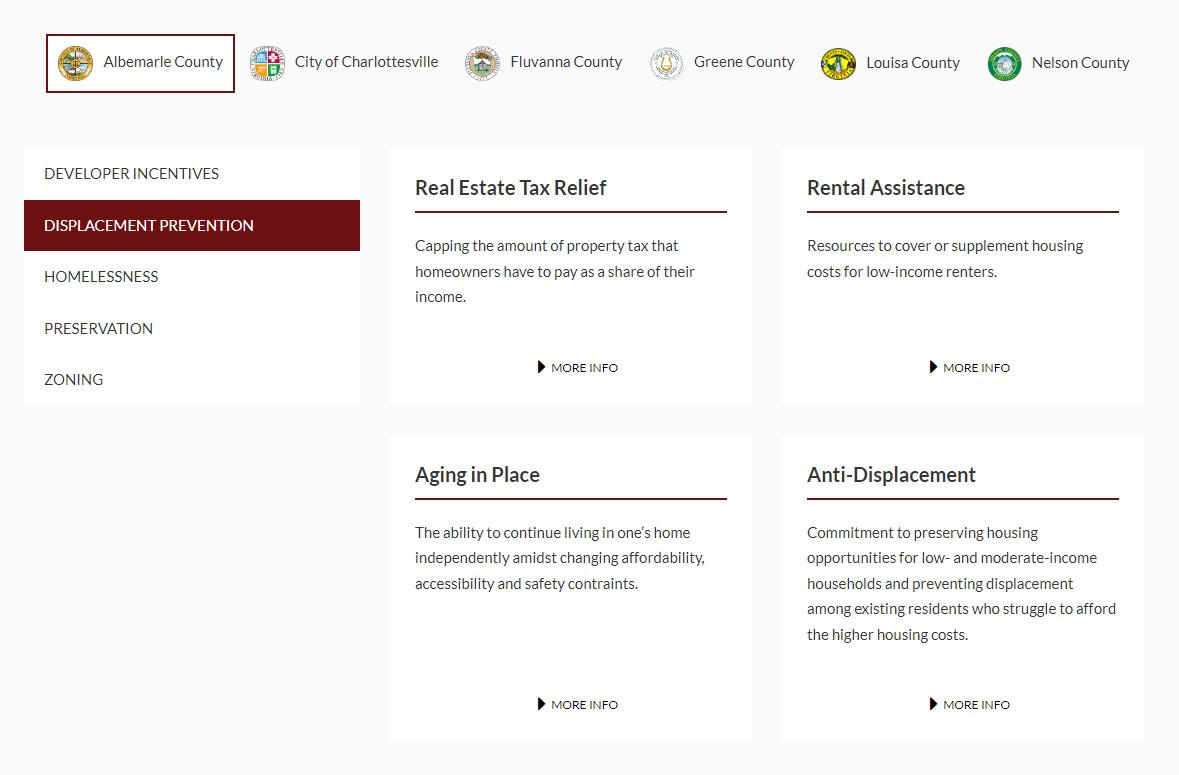The Central Virginia Regional Housing Partnership (CVRHP) is excited to announce the launch of our new Regional Housing Dashboard. This innovative tool was developed by our dedicated Regional Affordable Housing AmeriCorps VISTA member, Davy Sell, during her 2023-2024 service year. The dashboard is designed to provide comprehensive, up-to-date data and resources to support housing policy and decision-making in our region.
INTRODUCING THE ARCGIS DASHBOARD
One of the standout features of our new Regional Housing Dashboard is the ArcGIS dashboard, which leverages the latest Census data from the 2022 American Community Survey (ACS) 5-Year estimates. This powerful tool offers detailed insights into housing dynamics across our region, including:
Household Tenure: Breakdown of the number of households owned and rented.
Cost Burden: Analysis of the cost burden associated with different tenures, highlighting the financial pressures on homeowners and renters.
Median Rents and Incomes: Data on median rents and incomes to help understand housing affordability.
Racial Breakdown of Renters: Insight into the demographic composition of renters, which is crucial for addressing equity in housing.
This dashboard empowers policymakers, stakeholders, and community members with the information needed to make informed decisions and drive effective housing strategies.
EXPLORING THE AFFORDABLE HOUSING POLICY MATRIX
Another key feature of our Regional Housing Dashboard is the Affordable Housing Policy Matrix. This matrix is an invaluable resource for understanding and implementing housing policies across our six localities. Key components of the matrix include:
Policy Definitions and Strategies: Clear explanations of common housing policies and strategies.
Implementation Analysis: Detailed analysis of how these policies are being implemented in each of our six localities.
Toolkits and Policy Briefs: Access to relevant toolkits and policy briefs that provide deeper insights into each strategy and its application to affordable housing.
Community Resources: A collection of resources to help community members and stakeholders better understand housing policies and their impacts.
The Affordable Housing Policy Matrix serves as a comprehensive guide for anyone involved in housing policy, from local government officials to community advocates.
THE IMPACT OF OUR AMERICORPS VISTA

Davy Sell
This groundbreaking dashboard is a testament to the hard work and dedication of our Regional Affordable Housing AmeriCorps VISTA member. Throughout her service year, she has played a crucial role in creating and refining our data and communications strategy. Her contributions have laid a strong foundation for our ongoing efforts to improve housing affordability and equity in Central Virginia.
CONCLUSION
The launch of the Regional Housing Dashboard marks a significant milestone for the RHP. We are excited to share this resource with our community and look forward to seeing the positive impact it will have on housing policy and decision-making in our region.
As we celebrate this achievement, we are also thrilled to welcome our new AmeriCorps VISTA member, who will be joining us this month. The VISTA program has been instrumental in advancing our mission, and we are eager to see the fresh perspectives and energy our incoming VISTA will bring to the team. Their work will continue to build on the strong foundation laid by their predecessor, ensuring that we keep making strides in our efforts to address affordable housing challenges.
We invite you to explore the dashboard and leverage its powerful features to support your work in advancing affordable housing solutions.
Subscribe to stay tuned for more updates and insights from CVRHP as we continue to work towards a more equitable and affordable housing landscape for Central Virginia!
- Improved Manufactured Home Lot Rental Act (MHLRA) (Del. Delaney, Sen. Hashmi)
- HB 572 / SB 232 increases protections for manufactured home park residents and removes confusion from the MHLRA by limiting the amount of late fees park owners can charge for unpaid rent, granting a right of redemption for tenants facing eviction for unpaid rent, prohibiting the automatic renewal of a lease if the tenant gives proper notice of termination, and clarifying the allowable reasons for eviction.
- Increased Relocation Funds for Manufactured Home Park Residents (Del. Krizek)
- HB 1397 requires a manufactured home park owner to provide each resident with $5,000 to cover relocation expenses if their rental agreement is terminated due to the sale of the park to a buyer planning to redevelop or change its use.
- Automatic Eviction Record Expungement (Del. Hope)
- HB 73 requires courts to automatically expunge eviction records for dismissed cases after 30 days and for nonsuited cases after 6 months.
- Early Lease Termination for Survivors of Domestic Violence (Del. Delaney)
- HB 764 gives victims of domestic violence or sexual abuse the right to terminate a rental agreement early if they have a permanent protective order and give proper written notice of termination.
- Increased Maximum Building Code Violation Fines (Del. McQuinn, Sen. Bagby)
- HB 578 / SB 538 increases the maximum fine localities can impose for repeated violations of the Uniform Statewide Building Code, defined as three or more offenses of the same nature within a ten-year period.
- Single Exits for Residential Buildings Workgroup (Del. McClure, Sen. VanValkenburg)
- HB 368 / SB 195 creates an advisory group to evaluate and suggest changes to the Uniform Statewide Building Code that would permit the use of single exit stairways in multifamily residential buildings under six stories and thus allow more dense and diverse housing in Virginia.
- Increased Community of Opportunity Program (COP) Tax Credits (Del. Willett)
- HB 1203 increases the amount of tax credits available for landlords renting to Housing Choice Voucher holders in high opportunity areas and earmarks a portion specifically for use in rural regions.
- Community Revitalization Funds (Del. Coyner, Sen. Locke)
- HB 478 / SB 49 enable all localities to establish Community Revitalization Funds, which can be used to prevent neighborhood deterioration through residential and infrastructure development



